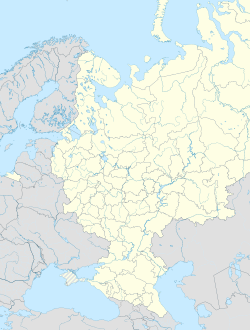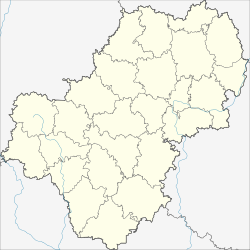Polotnyany Zavod
| Urban-type settlement
Polotnjany
Zavod Полотняный Завод
|
||||||||||||||||||||||||||||||||||||
|
||||||||||||||||||||||||||||||||||||
|
||||||||||||||||||||||||||||||||||||
Polotnjany Zavod ( Russian Полотня́ный Заво́д ) is an urban-type settlement in the Kaluga Oblast in Russia with 5224 inhabitants (as of October 14, 2010).
geography
The place is about 30 km in a straight line to the northwest of Oblastverwaltungszentrums Kaluga on the left bank of the Schanja and on either side of opening out there from left Suchodrew . The Shanja flows into the left Oka tributary Ugra about 7 km southwest from the left .
Polotnjany Zavod belongs to Dzerzhinsky Rajon and is located about 8 km southeast of its administrative center Kondrovo . It is the seat and only locality of the municipality (gorodskoje posselenije) Possjolok Polotnjany Zavod.
Monument for temporarily stationed during World War II near French fighter squadron Normandie-Niemen
history
The place was created in 1718 in connection with the establishment of a canvas factory by the Kaluga merchant Timofei Filatow-Karamyshev on the instructions of Tsar Peter the Great ; Derived from this, the place name means "cloth". In 1720 a paper mill was opened together with the local aristocrats Grigori Schtschepotschkin and Afanassi Goncharov, which is still in operation today. The Schtschepotschkin and Goncharov families had large estates built in the village, which have also largely been preserved or were rebuilt after being destroyed in the Second World War .
The place initially belonged to the Ujesd Medyn , initially as part of the Moscow Governorate , from 1796 to the newly formed Kaluga Governorate . During the Napoleonic campaign in Russia in 1812, after the battle of Maloyaroslavets , the Goncharov estate was temporarily the headquarters of the Russian commander-in-chief Mikhail Kutuzov .
In 1925, Polotnyany Zavod received urban-type settlement status. During the Second World War, the settlement was occupied by the German Wehrmacht from October 12, 1941 to January 18, 1942 and was particularly badly affected during the several days of fighting during the reconquest by the Red Army .
Population development
| year | Residents |
|---|---|
| 1859 | 2632 |
| 1897 | 3685 |
| 1939 | 5743 |
| 1959 | 7506 |
| 1970 | 6257 |
| 1979 | 5926 |
| 1989 | 5441 |
| 2002 | 5742 |
| 2010 | 5224 |
Note: from 1897 census data
traffic
In Polotnjany Zavod there is a station at kilometer 129 of the railway line Vyazma - Kaluga - Ryashsk , which opened in 1874 and was electrified between 1967 and 1971 on the section from Kaluga to Polotnjany Zavod (between the two places the main line Moscow - Kiev becomes the transition consists, crossed).
The regional road 29K-008 runs through the settlement, which begins at Kaluga on the federal highway M3 Moscow - Bryansk - Ukrainian border and continues via Kondrovo to Medyn, where it reaches the federal highway A130 from Moscow to Roslavl and the Belarusian border .
Personalities
- Natalia Goncharova (1812–1863), wife of the poet Alexander Pushkin , spent part of her youth on the family estate in Polotnjany Zavod and some time after Pushkin's death; Pushkin himself also stayed there several times
- Anatoly Vinogradow (1888–1946), writer, born in Polotnjany Zavod
Web links
Individual evidence
- ↑ a b Itogi Vserossijskoj perepisi naselenija 2010 goda. Tom 1. Čislennostʹ i razmeščenie naselenija (Results of the All-Russian Census 2010. Volume 1. Number and distribution of the population). Tables 5 , pp. 12-209; 11 , pp. 312–979 (download from the website of the Federal Service for State Statistics of the Russian Federation)






